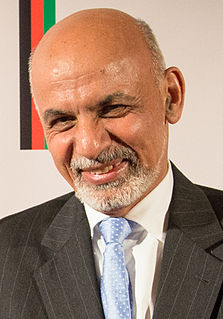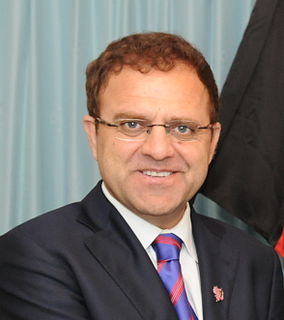
The politics of Afghanistan consists of the council of ministers, provincial governors and the national assembly, with a president serving as the head of state and commander-in-chief of the Afghan Armed Forces. The nation is currently led by President Ashraf Ghani who is backed by two vice presidents, Abdul Rashid Dostum and Sarwar Danish. In the last decade the politics of Afghanistan have been influenced by NATO countries, particularly the United States, in an effort to stabilise and democratise the country. In 2004, the nation's new constitution was adopted and an executive president was elected. The following year a general election to choose parliamentarians took place.

Anwar ul-Haq Ahady is a politician in Afghanistan, formerly serving as Afghan Minister of Commerce and Industry. He had served as the nation's Finance Minister from December 2004 to February 5, 2009. Prior to that he held the position as head of Da Afghanistan Bank, the central bank of Afghanistan. He is also prominent academic and writer.
Mohammad Qasim Fahim, also known as "Marshal Fahim"; 1957 – 9 March 2014) was a politician in Afghanistan who served as Vice President from June 2002 until December 2004 and from November 2009 until his death. Between September 2001 and December 2004, he also served as Defense Minister under the Afghan Transitional Administration.

Mohammad Ashraf Ghani Ahmadzai ; born 19 May 1949 as the son of Shah Jan in Logar, is an Afghan politician and current President of Afghanistan, elected on 21 September 2014. An anthropologist by education, he previously served as finance minister and the chancellor of Kabul University.
Mohammad Yahya Maroofi, is an ethnic Pashtun from the Barakzai tribe. His family is from District Maroof Kandahar, Afghanistan.
The Afghan Social Democratic Party, more commonly known as the Afghan Millat Party or simply the Afghan Millat, is a Pashtun nationalist political party in Afghanistan. Controversially, the party's leadership describes it as social democratic, but it is not recognized as such by the Socialist International. The party's current leader is Stanagul Sherzad who became the new leader after the 6th party congress on October 3, 2012.

The Cabinet of Afghanistan is made of the heads of all the government ministries. The president selects the members of cabinet with the approval of the National Assembly. Candidates for a ministerial position must be an Afghan citizen, be at least 35 years of age and have higher education. Ministers, unlike the president and vice presidents, can have citizenship of another country, but the Wolesi Jirga has in the past rejected ministers for the reason of having dual citizenship.
Taj Mohammad Wardak is an Afghan politician, from the Pashtun ethnic group. He spent some of the period of the Taliban's administration in the United States of America, and became an American citizen.
The following lists events that happened during 2002 in Afghanistan.

Mohammad Hanif Atmar is the former Interior Minister of Afghanistan. He was removed from MOI by Hamid Karzai in the wake of attacks on the June 2010 Afghan Peace Jirga. Before that he worked with several international humanitarian organizations and served as Minister of Rural Rehabilitation and Development and Minister of Education. In 2011, he is part of the Right and Justice party. During his time in office, he has visited several countries to get funding to stabilize Afghanistan. Atmar was serving as National Security Advisor to Ashraf Ghani the President of Afghanistan. He resigned from his post as there was disagreement with Ghani on certain issues. In late 2018, Atmar announced his candidacy for the April 2019 presidential elections, indicating he firmly believes a peace deal with the Taliban is possible.
Mohammad Umer Daudzai is a Politician in Afghanistan, most recently having served as the Minister of Interior during the challenging 2014 electoral year. After a career with international non-governmental organizations including the United Nations Development Program in Geneva, Daudzai started work as two term Chief of Staff of Afghan President Hamid Karzai from 2003 to 2005 and then from 2007 to around 2010. From 2005 until 2007, President Karzai appointed him as Afghan Ambassador in Iran. He then served as Afghan Ambassador to Pakistan, tasked with advancing efforts to reach a political solutions to the war in Afghanistan. In September 2013, Daudzai was asked to serve as Afghan Minister of the Interior in Kabul and instead ensure security for the elections.
Current and past governments of Afghanistan have included a Minister of Commerce in the Afghan cabinet. The Ministry of Commerce creates the enabling environment for sustainable and equitable economic growth and opportunity for all Afghans by promoting private sector development in a socially responsible free market economy. The Ministry has three basic goals: a) to promote the establishment and implementation of a legal and regulatory framework necessary for a free market economy b) to integrate Afghanistan into the regional and global economy and c) to facilitate and promote the development of a dynamic, competitive private sector.

Omar Zakhilwal is a politician in Afghanistan, is the current Afghanistan ambassador to Pakistan and served as the Finance Minister and Chief Economic Advisor to the President Hamid Karzai. He is also the president of the Afghanistan Cricket Board.

The Karzai administration was the government of Afghanistan under President Hamid Karzai, who became the head of state of Afghanistan in December 2001 after the Taliban government was overthrown. Karzai was appointed at the 2002 Loya Jirga as the Interim President of the Afghan Transitional Administration. After the 2004 Afghan presidential election, he became the President of Afghanistan.
The First Karzai cabinet lead the administration of Afghanistan between 2004, the year Hamid Karzai won the first Afghan presidential election and 2009 when the second presidential election took place. In 2006 there was a major cabinet reshuffle. The first Karzai cabinet followed the Afghan Transitional Administration which was put in place by the 2002 loya jirga. Karzai announced the names of the cabinet on 23 December 2004. The cabinet was sworn in on 24 December 2002 and held its first cabinet meeting on 27 December. This cabinet consisted of 27 ministers, including two women.

Muhammad Sarwar Danish, is an Afghan politician who has been Vice President of Afghanistan since 2014. He previously served as Acting Minister of Justice from 2004 to 2010 and as Acting Minister of Higher Education from 2010 to 2014. When Daykundi province was carved out of Urozgan province in 2004, Danish became its first Governor.
2003 in Afghanistan. A list of notable incidents in Afghanistan during 2003
The second Karzai cabinet was the cabinet of Afghanistan that led the government from the re-election of president Hamid Karzai in 2009 until the end of his term in 2014. The cabinet consisted of the president, his two vice-presidents, 18 ministers who received approval from the Afghan Parliament, and 7 acting ministers who have not been approved.







